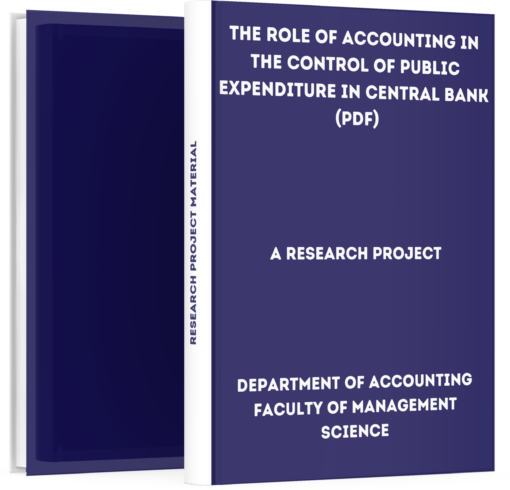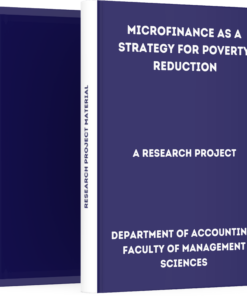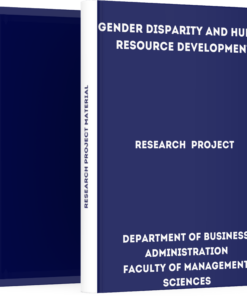The Role of Accounting in The Control of Public Expenditure in Central Bank (PDF)
₦3,000.00
If you are interested in getting this project material “The Role of Accounting in The Control of Public Expenditure in Central Bank (PDF)”, click on the DOWNLOAD BUTTON to make payment and the file will be delivered to your email immediately after confirmation.
Description
– The Role of Accounting in The Control of Public Expenditure in Central Bank (PDF) –
Download The Role of Accounting in The Control of Public Expenditure in Central Bank (PDF). Students who are writing their projects can get this material to aid their research work.
Abstract
This research examines the role of accounting in the control of public expenditure in Nigeria, a case study of control bank in Nigeria, Akwa Ibom State.
The research used both primary and secondary source of data. In view of this, three research questions were formulated to generate expected answers.
Literal works were interviewed for proper understanding and guidance.
Personal interview and observation were used to collect primary data. Secondary source data were collected from textbooks, periodical, articles, and journals.
Tables and simple percentage were used for data analysis, research question were tested using chi-square statistics.
Based on the findings, the research found out that few of the staff were not following due accounting principles thereby causing inadequate and improper pursuit of the accounting records omission of certain book-keeping records, improper audit.
The staff and management of Central Bank of Nigeria has now adopted accounting standard, and the balance of power on NASC, financial analyst government agencies and other. Family the researcher preferred among other users of accounting principle and standard in the company.
Introduction
1.1 Background of the Study
In most developing countries including Nigerian government participation in economic activity is usually significant.
One of the ways through which government has intervened in Nigeria economy is through the establishment of public enterprise and statutory bodies operating service of an economic or social character on behalf of the government.
Since the colonial era, especially after independence in 1960, Nigerian Public enterprises have witnessed a steady growth unit recently. Its Olisa (1988-133) pet it.
Beginning as a tickle in the period between this era of the second world war and Nigeria risen to flood level since independence the establishment of public enterprise in Nigeria are many add to available rational capital for the support of development and welfare programme.
Making to be controlled by a few individual, it possible for important profitable enterprise to be controlled by a few individual or group organization certain critical activities national survival and economic stability and providing opportunity (Ademolukun 1983).
However, after a long period of growing starts intervention economy in the Nigeria economy through public enterprises, the 1980’s onwards had witnessed a reversed which has sometimes been dramatic in public opinion therefore public policy.
This has been brought by the persistent losses which state enterprises that trivet been running over fears, consequently, there has been a willingness to look at alternative policy strategies for the achievement of economic development. At the forefront of these strategies is the minimization of public enterprises.
In Nigeria, public enterprises are engaged in a while spectrum of economic activities including agriculture, mining, construction, manufacturing, commerce and services. The classification of public enterprises in Nigeria has been made according to varieties of criteria by different authorities.
The public service review commission (195:10) classified public sector in public utilities. Regulatory of the service body, financial institutions, commercial and industrial enterprise.
Being a mixed economy, individuals also own and operate private enterprises. A firm classifies as private enterprises when it is founded and managed by an individual and or a group of individual.
How to Download this Project Material
First, note that we are one of the best and most reliable online platforms because we don’t retain any of your personal information or data as regards making payments online.
PRICE: ₦3,500 ₦3,000 (Three Thousand Naira Only)
Make a bank deposit or mobile transfer of ₦2,000 only to the account given below;
Bank Name: UBA Account Number: 1022564031 Account Name: TMLT PRO SERVICES
After making the payment, CLICK HERE to send the following on WhatsApp;
- Depositor’s Name or Screenshot of Payment
- Name of the Past Question
- Active Email Address
or Call Us On +2348082284439 Once your details have been received and your payment confirmed by us, you will receive the past question in your email or WhatsApp within 5 Minutes.
Guarantee of Getting the Material
We understand that due to the high rate of fraud, many people are afraid of making purchases online but be rest assured that PastExamQuestions will deliver your material after payment.
Once your details have been received and your payment confirmed by us, you will receive the past question in your email or WhatsApp.
Give us Feedback
Have we been able to satisfy you? How well do you think the material will be helpful after having gone through it? Does the price worth the material?
Let’s hear from you! We recommend that our customers give feedback at the end of every transaction to enable us to serve better. You can do this by clicking the review button on this page.
Where is the review button? >> Just scroll up to where you see reviews





Reviews
There are no reviews yet.